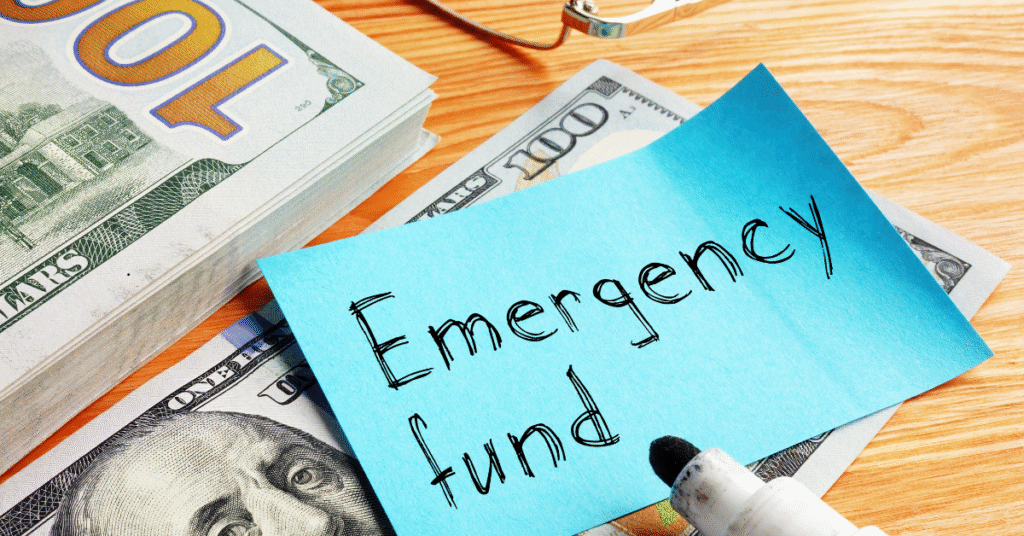10 Financial Goals For The New Year That Will Actually Change Your Life

Let’s be real here. How many times have you scribbled down New Year’s resolutions on January 1st, felt super motivated for about a week, and then completely forgotten about them by February? Yeah, me too.
But here’s the thing: when it comes to your money, that approach just won’t cut it anymore.
Financial goals for the new year aren’t just some fancy list you make to feel productive. They’re the blueprint for building the life you actually want.
Whether you’re drowning in debt, living paycheck to paycheck, or just want to level up your money game, setting solid financial goals is where the magic starts.
I’ve spent years studying finance and helping people fix their money messes, and I can tell you this: the difference between people who build wealth and those who don’t usually comes down to one thing. Planning.
So grab your coffee, and let’s talk about the financial goals that will actually move the needle this year.
Why Set Financial Goals For The New Year?
Look, I get it. Goal-setting sounds boring and kind of like homework. But stick with me here because this stuff matters more than you think.
When you don’t have clear financial goals, you’re basically driving with your eyes closed. Sure, you might move forward, but you’ll probably crash into something eventually. Setting financial goals for the new year forces you to think about what you really want and then create a roadmap to get there.
Think about it this way: would you start a road trip without knowing your destination? Probably not. So why would you go through an entire year without knowing where you want your money to go?
Importance Of Setting Financial Goals
Before we jump into the actual goals, let’s talk about why this whole goal-setting thing is such a big deal. Trust me, understanding the ‘why’ makes the ‘how’ so much easier.
Setting Financial Goals Creates Clarity And Focus
Ever feel like your money just disappears and you have no idea where it went? That’s what happens when you don’t have clear priorities. Setting specific financial goals gives you laser focus on what actually matters to you.
For example, if you decide that saving for a house down payment is your top priority, suddenly those impulse purchases don’t seem as appealing. You start asking yourself, “Do I really need this, or would I rather be closer to owning my own place?” That’s the power of clarity, my friend.
When you know exactly what you’re working toward, every financial decision becomes easier. You’re not just randomly spending money and hoping for the best. You’re making intentional choices that align with your bigger picture.
Setting Financial Goals Keeps You Motivated And Accountable
Here’s something I’ve learned: motivation without accountability is just wishful thinking. When you set financial goals at the start of the year, you’re giving yourself something concrete to chase.
There’s something incredibly satisfying about tracking your progress and watching those numbers grow. Whether it’s seeing your debt balance shrink or your savings account expand, those small wins keep you pumped up to continue.
Plus, when you write down your goals and maybe even share them with someone you trust, you’re creating accountability. It’s way harder to blow your budget on random stuff when you know you promised yourself (and maybe your accountability partner) that you’d stick to your plan.
Setting Financial Goals Creates Security
Want to know what real security feels like? It’s not about having a fancy job title or a big house. It’s about knowing that if something goes wrong, you’ll be okay.
When you set goals like building an emergency fund or planning for retirement, you’re literally building a safety net for yourself. Life throws curveballs, and having that financial cushion means those curveballs won’t knock you out of the game.
I’ve seen people lose their jobs, face medical emergencies, or deal with unexpected home repairs. The ones who had planned for these possibilities? They handled it with way less stress. The ones who hadn’t? Well, let’s just say it wasn’t pretty.
Setting Financial Goals Improves Your Lifestyle
This is the fun part! Financial goals aren’t just about being responsible and boring. They’re about creating the life you actually want to live.
Want to travel more? Start a business? Buy a home? Move to a better neighborhood? All of these dreams require money, and financial goals are how you make them happen. When you plan properly and stick to your goals, you’re not just improving your bank balance. You’re upgrading your entire life.
And here’s a bonus: when your finances are in order, you stress less. Money problems are one of the biggest sources of anxiety for people.
When you’ve got a solid financial plan and you’re making progress, that weight lifts off your shoulders. You sleep better, you argue less with your partner, and you just feel more in control of your life.
10 Financial Goals For The New Year
Alright, enough with the theory. Let’s get into the actual goals you should be setting this year. These aren’t just random suggestions. They’re the fundamental building blocks of financial success that I’ve seen work for countless people.
1. Pay Off Debt

If you’re carrying debt, especially high-interest credit card debt, this needs to be at the top of your list. Seriously. I can’t stress this enough.
Here’s why: debt is like a leaky bucket. You can keep pouring money in, but until you patch that hole, you’ll never get ahead.
Those interest charges are literally stealing your future wealth. Every dollar you pay in interest is a dollar that could have been invested, saved, or used to improve your life.
Now, there are different strategies for tackling debt. The debt avalanche method means you focus on paying off the debt with the highest interest rate first.
Mathematically, this saves you the most money. The debt snowball method has you pay off the smallest debts first, which gives you quick wins and keeps you motivated.
Honestly? Pick whichever method you’ll actually stick with. The best debt payoff strategy is the one you’ll follow through on. I’ve seen people succeed with both approaches, so don’t get too hung up on which is “better.”
Set a specific goal here. Don’t just say “pay off debt.” Say “pay off $5,000 in credit card debt by December” or “eliminate my car loan in 18 months.” Specific goals get specific results.
2. Increase Savings

Saving money is like going to the gym. Everyone knows they should do it, but actually doing it consistently? That’s where people struggle.
The magic number that financial experts love to throw around is 20% of your income. Now, I know that might sound impossible if you’re just starting out, and that’s okay. Start where you can, even if it’s just 5% or 10%. The important thing is to start and then gradually increase that percentage as you get raises or pay off debts.
Here’s my favorite trick: automate your savings. Seriously, this is a game-changer. Set up an automatic transfer from your checking account to your savings account on payday. When the money moves automatically, you don’t have to rely on willpower or remember to do it. It just happens.
And please, for the love of all that is holy, open a high-yield savings account. If your money is sitting in a traditional bank earning 0.01% interest, you’re basically losing money to inflation. Online banks often offer interest rates that are 10-15 times higher. It’s free money just for parking your cash in a different place. Why wouldn’t you do that?
3. Find A Flexible Spending Plan

Notice I didn’t say “create a strict budget that makes you miserable.” That’s because rigid budgets don’t work for most people. They feel restrictive and make you want to rebel against your own plan (which is weird, but we’re all guilty of it).
Instead, think about creating a flexible spending plan that prioritizes what matters most. The basic framework I recommend is the 50/30/20 rule, but with room for adjustment based on your life.
Here’s how it breaks down: about 50% of your income goes to needs. That’s housing, transportation, groceries, utilities, and other essentials. Then 30% goes to wants, which is the fun stuff like entertainment, dining out, and hobbies. Finally, 20% goes to savings and debt repayment.
Now, these percentages aren’t set in stone. If you’re aggressively paying off debt, you might do 50/20/30 instead. If you live in an expensive city, your needs might be 60% and you’ll need to adjust elsewhere.
The point is to have a general framework that keeps you on track without making you feel like you’re living on bread and water.
Use budgeting apps like Mint, YNAB (You Need A Budget), or EveryDollar to track your spending automatically.
These tools connect to your bank accounts and categorize your expenses, so you can see exactly where your money is going without manually tracking every single purchase.
4. Build Or Strengthen Your Emergency Fund

If 2020 taught us anything, it’s that unexpected stuff happens. And when it does, you need cash ready to handle it.
An emergency fund is your financial safety net. It’s the money that sits there (hopefully unused) for when life throws you a curveball. Lost your job? Emergency fund. Car breaks down? Emergency fund. Surprise medical bill? You guessed it, emergency fund.
The standard advice is to save 3 to 6 months of living expenses. That means if your monthly expenses are $3,000, you should have between $9,000 and $18,000 in your emergency fund. I know that sounds like a lot, but remember, you don’t have to build it overnight.
If you’re starting from zero, aim for $1,000 first. That small cushion will cover most minor emergencies and give you peace of mind. Then work your way up to one month of expenses, then three, and so on.
Keep this money in a separate high-yield savings account that you don’t touch for regular expenses. It needs to be accessible if you need it, but not so accessible that you’re tempted to dip into it for non-emergencies. (No, a sale at your favorite store doesn’t count as an emergency, sorry.)
5. Increase Your Retirement Savings

I know retirement feels like it’s a million years away, especially if you’re in your 20s or 30s. But here’s the thing: future you is going to be so grateful that present you started saving now.
Time is literally the most valuable asset you have when it comes to retirement savings. Thanks to compound interest, money you invest today will grow exponentially more than money you invest later. It’s not just about how much you save, it’s about how long that money has to grow.
If your employer offers a 401(k) with matching contributions, you need to contribute at least enough to get the full match. This is free money, people! If your employer matches 50% of your contributions up to 6% of your salary, and you’re not contributing that 6%, you’re literally leaving money on the table.
Beyond the 401(k), consider opening an IRA (Individual Retirement Account). You can choose between a Traditional IRA (tax deduction now, pay taxes later) or a Roth IRA (no tax deduction now, but tax-free withdrawals in retirement). For most young people, Roth IRAs are amazing because you’re likely in a lower tax bracket now than you will be in retirement.
Aim to increase your retirement contributions by at least 1% this year. If you’re currently saving 5% of your income, bump it up to 6%. You probably won’t even notice the difference in your paycheck, but your future self will definitely notice the difference in your retirement account.
6. Boost Your Credit Score

Your credit score is like your financial report card, and it affects way more than you might think. We’re talking about interest rates on loans, approval for rental applications, insurance premiums, and sometimes even job opportunities.
A good credit score can literally save you tens of thousands of dollars over your lifetime through lower interest rates. The difference between a 4% and a 6% interest rate on a $300,000 mortgage? About $130,000 over 30 years. Yeah, it’s that serious.
So how do you improve your credit score? Here are the key factors:
- Payment history (35% of your score): Pay every bill on time, every time. Set up automatic payments if you need to. Even one late payment can ding your score.
- Credit utilization (30% of your score): Keep your credit card balances below 30% of your credit limit. Even better, keep them below 10%.
- Length of credit history (15% of your score): Keep old credit cards open, even if you don’t use them much. The longer your credit history, the better.
- Credit mix (10% of your score): Having different types of credit (credit cards, car loan, mortgage) can help, but don’t take out loans just to improve this factor.
- New credit inquiries (10% of your score): Don’t apply for a bunch of new credit cards all at once. Each application can temporarily lower your score.
Check your credit report regularly. You’re entitled to a free credit report from each of the three major bureaus (Equifax, Experian, and TransUnion) once a year through AnnualCreditReport.com. Review them for errors and dispute anything that’s incorrect.
7. Optimize Your Insurance Coverage
Insurance is one of those things that seems boring and unnecessary until you desperately need it. Then it becomes the most important thing in the world.
At the start of each year, review all your insurance policies. Life changes, and your insurance needs to change with it. Got married? Had a kid? Bought a house? Started a business? All of these life events should trigger an insurance review.
Here are the main types of insurance you should consider:
- Health insurance: Non-negotiable. Medical bills are the number one cause of bankruptcy in the U.S.
- Life insurance: If anyone depends on your income, you need life insurance. Term life insurance is usually the most affordable and straightforward option.
- Disability insurance: Your ability to earn income is your most valuable asset. Disability insurance protects that if you get injured or sick and can’t work.
- Homeowners or renters insurance: Protects your home and belongings. Renters insurance is super cheap and totally worth it.
- Auto insurance: Required by law in most places, and essential for protecting yourself from financial disaster if you’re in an accident.
Don’t just stick with the same policies year after year without reviewing them. Shop around for better rates, increase coverage where needed, and drop coverage that no longer makes sense. An hour spent reviewing your insurance could save you hundreds or even thousands of dollars.
8. Examine Your Investment Portfolio
If you’re investing (and you should be), you can’t just set it and forget it. Your investment portfolio needs regular check-ups, kind of like going to the dentist but way more interesting.
At least once a year, review your portfolio to make sure it still aligns with your goals and risk tolerance. As you get older, you’ll generally want to shift toward more conservative investments. The classic rule is to subtract your age from 110 to determine what percentage should be in stocks versus bonds. So if you’re 30, about 80% stocks and 20% bonds.
Look at your asset allocation. Are you too heavily invested in one sector or one type of investment? Diversification is your friend. It spreads out risk so that if one investment tanks, your entire portfolio doesn’t go down with it.
Consider rebalancing your portfolio if things have gotten out of whack. If stocks have done really well, you might now have 90% in stocks when you wanted 80%. Sell some stocks and buy some bonds to get back to your target allocation. This forces you to “buy low and sell high,” which is exactly what you want to do.
Don’t forget about fees. High investment fees can eat away at your returns over time. If you’re paying more than 1% in fees annually, look for lower-cost alternatives. Index funds and ETFs typically have much lower fees than actively managed funds and often perform just as well (or better).
9. Create Passive Income

Here’s a truth: you’ll never get rich just from your salary. Wealthy people have multiple income streams, and many of those are passive or semi-passive.
Passive income is money you earn without actively trading your time for it. It usually requires upfront work or investment, but then it generates income with minimal ongoing effort. It’s the closest thing to “making money while you sleep” that actually exists.
Here are some realistic passive income ideas:
- Dividend-paying stocks: Invest in companies that pay regular dividends. You earn money just for holding the stock.
- Rental properties: Real estate can generate monthly rental income. Yes, there’s work involved, but you can hire a property manager to handle most of it.
- REITs (Real Estate Investment Trusts): Want real estate income without the hassle of being a landlord? REITs let you invest in real estate through the stock market.
- Create digital products: Write an ebook, create an online course, or design printables. You create it once and can sell it repeatedly.
- Affiliate marketing: If you have a blog or social media following, you can earn commissions by recommending products you actually use and love.
- High-yield savings and CDs: Okay, the returns are modest, but your money earns interest without you doing anything.
Start small. You don’t need to quit your job and become a full-time real estate mogul. Even an extra $200-500 per month in passive income can make a huge difference in your financial life. That’s money that can go straight to savings, debt payoff, or fun stuff without affecting your regular budget.
10. Review And Update Estate Plans
I know, I know. Estate planning sounds depressing and like something only old rich people need to worry about. But here’s the reality: if you have any assets or anyone who depends on you, you need at least a basic estate plan.
Estate planning isn’t just about what happens to your stuff when you die. It’s also about who makes decisions for you if you’re incapacitated and can’t make them yourself. It’s about making things easier for your loved ones during an already difficult time.
At minimum, you should have:
- A will: This specifies who gets your assets and, if you have kids, who becomes their guardian. Without a will, the state decides all of this for you.
- Beneficiary designations: Make sure your retirement accounts, life insurance policies, and bank accounts have up-to-date beneficiaries listed.
- Healthcare directive: This specifies your wishes for medical care if you can’t communicate them yourself.
- Power of attorney: This designates someone to make financial and legal decisions for you if you’re unable to.
Life changes, so your estate plan should too. Got married or divorced? Had a kid? Experienced a major change in assets? Review and update your estate plan. Also review it every few years even if nothing major has changed, just to make sure everything still reflects your wishes.
You can create basic estate planning documents online through services like LegalZoom or Trust & Will, or work with an estate planning attorney for more complex situations. Either way, getting this done gives you incredible peace of mind.
Final Thoughts
Look, I’m not going to sugarcoat it. Achieving financial goals takes work. It requires discipline, consistency, and sometimes saying no to things you want right now so you can say yes to bigger things later.
But here’s what I know from years of working with people on their finances: the effort is so worth it. The peace of mind that comes from having your financial house in order? Priceless.
The freedom that comes from not living paycheck to paycheck? Life-changing. The opportunities that open up when you have savings and good credit? Incredible.
The best time to start working on your financial goals was yesterday. The second best time is right now. So what are you waiting for? Your future self is counting on you. Let’s make this year the one where you finally get your money right. You’ve got this! 🙂








